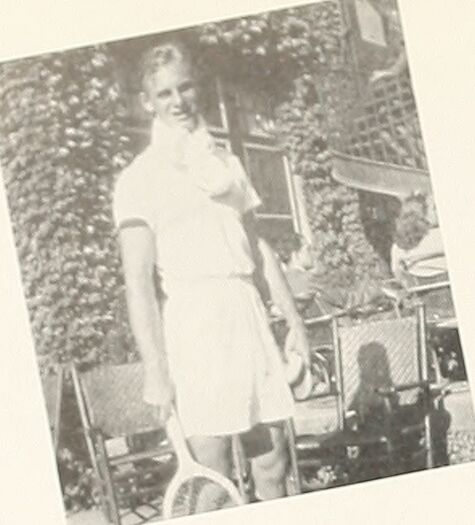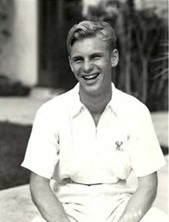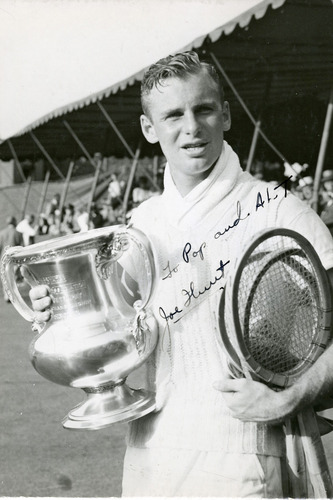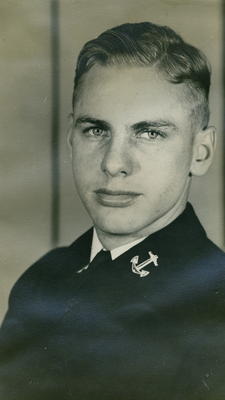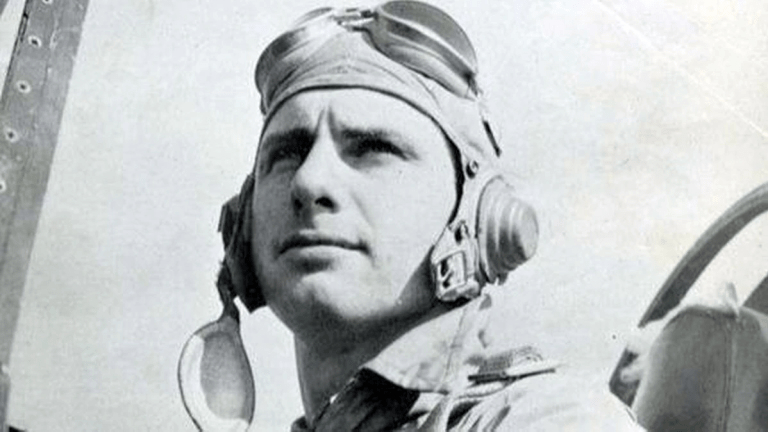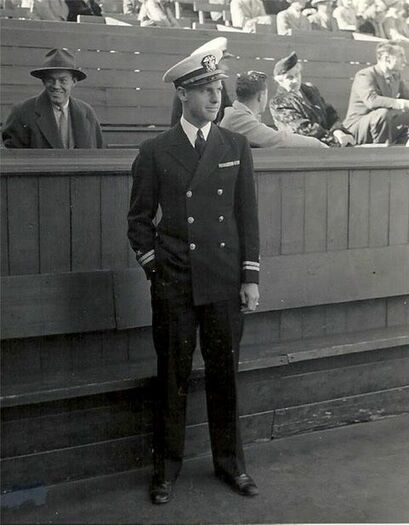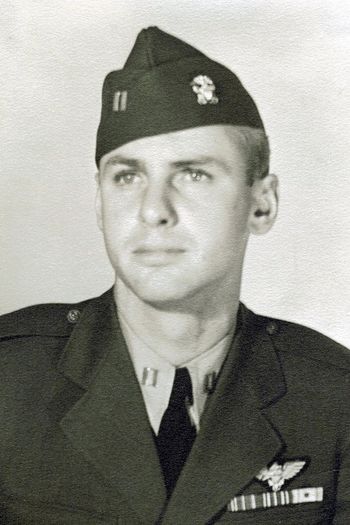JOSEPH R. HUNT, LT, USN
Joseph Hunt '42
Lucky Bag
From the 1942 Lucky Bag:
JOSEPH R. HUNT
Los Angeles, California
Joe
Yes, this is Joe — the highest ranking collegiate tennis player in the country. But this alone is quite insufficient, for behind it all the California boy is a natural at almost anything. Though he has matched the best that Budge, Riggs, and McNiell have had to offer one of his most regarded accomplishments is that N* in football. To find a more genuine personality is a mighty hard task.
Football 3, 2, 1, N*; Basketball 4, 2, 1, 42; Tennis 4, 3, 2, tNt; P.P.O.
The Class of 1942 graduated on December 19, 1941, less than two weeks after the United States entered World War II. The class had previously been scheduled to graduate in February 1942.
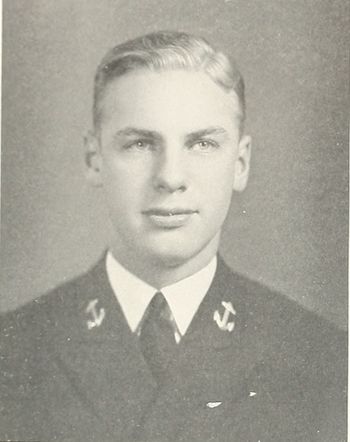
JOSEPH R. HUNT
Los Angeles, California
Joe
Yes, this is Joe — the highest ranking collegiate tennis player in the country. But this alone is quite insufficient, for behind it all the California boy is a natural at almost anything. Though he has matched the best that Budge, Riggs, and McNiell have had to offer one of his most regarded accomplishments is that N* in football. To find a more genuine personality is a mighty hard task.
Football 3, 2, 1, N*; Basketball 4, 2, 1, 42; Tennis 4, 3, 2, tNt; P.P.O.
The Class of 1942 graduated on December 19, 1941, less than two weeks after the United States entered World War II. The class had previously been scheduled to graduate in February 1942.
Obituary
From Class History: 1942:
If there was any particularly outstanding star in the Class of 1942, it was Joe Hunt. He arrived at the Academy in 1938 as a member of the Davis Cup tennis team. It was impossible for him to complete a plebe summer at the Academy and still travel to practice with the Team. So the Team came to Annapolis. The regiment was treated to some fine tennis that summer. Joe became the intercollegiate champ in 1941. Then came World War II. Between assignments to destroyers during 1943, Joe went to Forest Hills, defeated Jack Kramer, became the U.S. Open Champion and ranked number one in the world. Then it was back to the War. In 1945, Joe received his wings as an aviator, but was killed in an operational accident shortly before the War ended.
From Find A Grave:
He served a year on a destroyer in the Pacific and a year in the Atlantic. After serving there, he requested reassignment to train as a fighter pilot. He had been reassigned to the Navy’s air arm when he was killed when his Navy F6 Grumman Hellcat single-seater fighter plane crashed at sea off the Florida coast east of the Naval Air Station at Daytona Beach during a gunnery practice flight. His plane went into a spin from 10,000 feet while he was making a run on a target being towed by another plane. His plane reportedly never pulled out of the spin, sinking immediately after it crashed. Rescue and crash boats that were sent to the scene found that the plane had sunk before they arrived, but parts of the plane were recovered later.
Prior to his military service, he was an American tennis player of the late 1930s and early 1940s, having played in his first tennis tournament at the age of 5. In 1938, he won the Ojai Valley Tennis Club Men's Intercollegiate Doubles tournament. At the Naval Academy, he excelled in both tennis and football, winning the game ball for his performance as a running back in the 1940 Army-Navy football game and an intercollegiate singles tennis championship in 1941. He was the number-one ranked American tennis player in 1943, winning the US singles championship in his final match. Bob Hope presented him with the 1943 Outstanding Athlete of the Year Award. He returned to duty aboard his Navy destroyer immediately after the match. To date he is the only man to have won the US boys' (15 and under), junior (18 and under), collegiate, and men's singles championship. He was inducted into the USTA Hall of Fame in 1966. The US Naval Academy is host to the annual Joe Hunt Invitational Tennis Tournament. Also at the USNA, in 2015 a plaque dedicated to him was unveiled at the entrance to the tennis court located just inside Gate 1. In addition to listing his accolades and designating the court as Joe Hunt Court, it also includes the following testimonial to him: “This court is dedicated to the memory and service of the most accomplished tennis player in US Naval Academy history.”
He was survived by his wife of 2 years, tennis player Jacque Carolyn Virgil Hunt Rowley (6/23/1917-7/21/1975); his parents; a brother; and a sister.
More details are also available at Wikipedia.
Remembrance
From Tennis Warehouse:
The following tribute to the American lawn tennis player Joseph R. Hunt was written on Sunday, February 4, 1945, and appeared in the March 1945 edition of "American Lawn Tennis". It was written by Stanley Wallis Merrihew, editor and publisher of "ALT", as it was popularly known, and all-round promoter of the sport of lawn tennis.
Lieutenant Joseph R. Hunt
By Stephen W. Merrihew
A tragedy that brings closer to our world this awful war was the one that brought to a close the life of Lieutenant Joseph R. Hunt, youngest scion of the family of that name, illustrious in the game of lawn tennis. He died in the line of duty, his F6F Grumman Hellcat having gone into a spin off the coast of Florida on February 2; the plane crashed and sank, as told elsewhere in this issue.
Joe Hunt had a tennis career that began when he was five years old. Born in San Francisco on February 17, 1919, his first tournament was the Bay Counties Championships at Golden Gate Park; his last was the [US] Championship of 1943, which he won by defeating Jack Kramer in a four-set battle. His first important success was in the 1934 Boys’ Championship and was followed by the win of the Junior [US] Championship in 1937. He won the Intercollegiate Championship in 1941, as was generally expected. In a nutshell these wins marked the salients of his tennis career.
While still in his teens, Joe was marked for eminence in the game which his father, Reuben G. Hunt of San Francisco, pursued long before Joe was born. ‘Played tennis throughout the United States regularly from 1898 to 1906’ is the way the elder Hunt put it in his Biographical Sketch, and the many tennis publications of the past make it plain that he attained considerable success. Joe was the youngest of three children, the others being a son, Charles, and a daughter, Marian. Both of them play tennis and have shown much promise.
In tournament circles Joe was long described as ‘dangerous’. He was also a determined and resourceful person, as was shown in the 1940 [US] Championship when he met Frank Kovacs and the latter staged a clowning attack. Joe sat down on the court, and even when Frank got down to business again and began to serve Joe sat there with his back turned and let some balls go by before resuming play. He eventually won the match in straight sets; in the next round Joe bowed to Bobby Riggs in five sets. Joe was alternately praised and criticized for this handling of a difficult situation.
When Joe won the Intercollegiate Championship in 1941 he was believed to have made his exit as a tennis player. He had entered the Naval Academy at Annapolis [in 1938], graduating at the end of 1941. But his greatest success was to come. Little was this known when Reuben Hunt boarded the train that was to carry him from Haverford (at the conclusion of the Intercollegiate final match) to Philadelphia en route to California. With Joe’s retirement the elder Hunt was to cease to follow the game as a spectator, he told me. All the players he knew or had heard of had passed from the scene and there was no incentive for him to become acquainted with the newcomers. But the United States soon entered World War II and Joe came forward as a contestant in the 1943 Championship meeting, which he won. He had hoped to be given leave to defend his title in the 1944 Championship but was disappointed.
‘A tall, blond Californian’ is the way one writer refers to Lieutenant Joseph R. Hunt. He was ‘6 feet even and weighed 160 pounds’, as he put it in his Biographical Sketch, made out in 1936. He was well poised, possessed of a considerable amount of self-confidence, but not too much of it. If the War had not intervened he would probably have won the great title earlier, despite the presence of Riggs, Donald McNeill and Frank Schroeder – or of other players who might have come to the front. He was possessed of the winning type of game and he made the best use of it. He made the net position his objective, and of course his volleying was well judged and effective. Yet he was not entirely at a disadvantage in the back court.
Shortly after the 1943 [US] Championship I was honoured by a visit at 366 Madison Avenue, from Lieutenant Hunt and Mrs Hunt. I had a slight acquaintance with Mrs Hunt, the former Jacque Virgil, but before the visit under discussion we came to know each other quite well. She told me – during a pause in the conversation between Joe and myself – of her interest in the match between her husband and Jack Kramer. That interest was keen and graphically evidenced; when she finished I almost believed that she had been on court with Joe!
During the conversation Joe gave me an insight into his knowledge of strategy and tactics by saying that after the match with Jack he was inclined to think that he had made a mistake in not prolonging the rallies. Joe’s physical condition was better than Jack’s and the latter could have been worn down by keeping the ball in play more.
Joe gave me a further insight into his character by a visit he paid me several years ago in New York. Soon after returning from Florida I had a heavy cold. Consequently I remained at home to give the ailment a chance to work itself out. Joe went to 500 Fifth Avenue, and learning of my condition he came over to the Hotel Webster to pay his respects, as it were. He remained for an hour or so and we had the pleasantest kind of a talk on a variety of subjects; tennis was by no means the only one of these, although we did not neglect it. It warmed the cockles of my heart – and apparently Joe had a good time also.
It has been my good fortune to know all of the Hunt family reasonably well, and that is why the news of Joe’s death came to me with such a shock. I had gone to Howard Park on Saturday afternoon and Bruce Thomas came to me and asked if I had heard of the lamentable happening. The news was in the papers, of course, and I read them all. Today, Sunday, I heard from Edwin Baker, with further details. It appears that Edwin had written to Mrs Hunt only recently and asked for some photos of her husband, and by a strange coincidence he received a reply from her on Saturday, the day of the accident.
The March issue of ‘ALT’ was being closed but will be held to get in the story of the death of a great figure in game, one who will be long remembered and whose passing will be deplored on every side.
This terrible global conflict is changing the face of the world. We are all in it and we know not at what minute it may strike us. To the Hunts, all of them, the sympathy of the tennis world will go forth, and their grief will be shared by all to the greatest possible extent. Even so it will be inadequate. To that lonely heart at Port Orange, Florida [Jacque Hunt], I express all that is in my power to put into words. --
These extracts are from another article featured in the same edition of "American Lawn Tennis":
Lieutenant Joseph R. Hunt, US Navy, national singles tennis champion in 1943, was killed February 2 when the F 6 Grumman Hellcat fighter plane he was flying in gunnery practice crashed at sea nineteen miles off the Florida coast east of the Naval Air Station at Daytona Beach.
Lieutenant Hunt's plane went into a spin from 10,000 feet, according to the report of navy officials, while he was making a 'run' on the a target being towed by another plane. It is reported that Joe never pulled out of the spin and the plane sank immediately after it crashed. Rescue and crash boats were rushed to the scene but the plane sank before the rescuers arrived. Later parts of the plane were rescued.
This article at the History Channel discusses a ceremony to honor Joe’s service and provides some details about how the US Tennis Association was reminded about Joe’s service.
Memorials
The annual military appreciation day at the US Open was renamed for Joe in 2013.
From 10sBalls on September 3, 2019:
Military Appreciation Day Honors Joe Hunt, Grand Nephew Joins Nadal For Coin Toss
By Ricky Dimon
The USTA announced last weekend that its annual Military Appreciation Day at the U.S. Open would be renamed in honor of Lt. Joe Hunt, the only U.S. Nationals or U.S. Open champion to lose his or her life in service to their country. Held annually on Labor Day at the Billie Jean King National Tennis Center, it was officially renamed the Lt. Joe Hunt U.S. Open Military Appreciation Day on Monday in its seventh year since beginning in 2013.
Born on Feb. 17, 1919 in San Francisco, Calif., Hunt played college tennis at the University of Southern California as a freshman went undefeated in singles and doubles play in 1938. After winning the intercollegiate doubles title he enlisted in the United States Naval Academy and joined the Navy football team as a running back during the 1940 season. He was given the game ball for the 1941 Army–Navy Game. Hunt made the semifinals at the 1939 and 1940 United States Singles Championships (now the U.S. Open) at Forest Hills. He won the title in 1943, doing so in dramatic fashion while cramping on match point against Jack Kramer.
Hunt was the top-ranked American in 1943 and was ranked as high as No. 5 overall in the world.
He was unable to defend his title in 1944 due to obligations with the Navy. At 25 years old, Hunt was killed when his fighter plane crashed in the Atlantic Ocean off the coast of Daytona Beach, Fla. He was inducted posthumously into the International Tennis Hall of Fame in 1966.
Hunt is the only player in history to win the U.S. national boys, junior, collegiate, and men’s singles titles.
“He was in active service as a lieutenant when he won the U.S. Open,” great nephew Joe Hunt noted. “He left USC after two years of school; he decided to start over with school at the Naval Academy. I think that shows a lot of what he was about; he was about wanting to serve the country. When he did that, everyone in tennis understood that he was pretty much sacrificing his tennis career for service. He probably would have done more in tennis…but he did enough.”
The U.S. Open welcomed members of the Hunt family, including great nephew Joe Hunt, for a ceremonial coin toss at the start of Monday’s night session. They were joined by Vice Admiral Sean S. Buck, the 63rd Superintendent of the United States Naval Academy and Navy men’s tennis coach Chris Garner for an on-court tribute to the late tennis champion. Rafael Nadal and Marin Cilic, who were contesting their fourth-round match, posed for photos following the coin toss.
“It’s an enormous honor for the family,” the younger Joe Hunt assured. “It’s to the USTA and U.S. Open’s credit that they have taken the life of Joe Hunt, taken his story, and truly understand what it means to have a national champion who gave his life to the country. The family is incredibly grateful to the USTA and U.S. Open for honoring Joe in a meaningful and lasting way.”
“He would be overwhelmed. I don’t think he was ever one to seek honor, glory, or attention. But I’m hoping that he feels something powerful in the fact that people remember him and remember what he gave to tennis and the country. I believe that he does see it and I believe that he does feel it.”
The U.S. Open did a commendable job of making sure fans felt the importance of Military Appreciation Day, and not just right before the Nadal-Cilic match. Videos were shown on all of the three main courts during various changeovers and in between matches. The National Anthem was sung by Tony Award-nominated actress and recording artist Melissa Errico, who has starred in seven Broadway shows and TV shows including Showtime’s “Billions.” Prior to the nightcap featuring Bianca Andreescu and Taylor Townsend, 13-year-old Daniel Wright of West Point, N.Y. was one of 12 winners selected to sing patriotic-themed songs and he performed “America The Beautiful.”
In support of the day’s celebration, Chase–a main U.S. Open sponsor–provided tickets for various military-affiliated organizations, including military service men and women from New York.
Photographs

The "category" links below lead to lists of related Honorees; use them to explore further the service and sacrifice of alumni in Memorial Hall.
